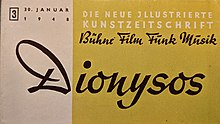Dionysus (magazine)
Dionysos - Bühne Film Funk Musik was a magazine published by Schiermeyer-Verlag in Berlin from 1947 to 1948 . It was entitled The New Illustrated Art Magazine and started circulating twice a month from January 1947. Why and when exactly it was discontinued in 1948 is not clear.
The editor-in-chief of the typically 30-page booklet was the film director Gerhard Grindel . As a social democrat (Grindel was deputy editor-in-chief of the SPD newspaper Der Sozialdemokrat in 1946 ) he gave the magazine a progressive line. In an editorial he discusses the question of how art can be understood in a socialist way. In the edition of February 13, 1948, “Berlin - back in ecstasy” is mentioned because the left-wing philosopher and writer Jean-Paul Sartre was in the city.
- “All art is socialist. This is where the criticism of taste ends. Socialist originally meant: society-preserving. Today one tendency asserts that it is the only thing that sustains society and therefore that it is solely socialist. It considers every conceivable phenomenon of life, including art, from a special 'socialist usefulness'. [...] All art is socialist - but only as long as the society-sustaining forces speak in it. "
The authors of Dionysus had a keen eye on foreign countries, such as the crisis in French films (because, unlike Italian films, it did not deal with the social misery of the post-war period), the formation of a radio monopoly in Japan or the premiere of the first Czech color film in Prague. The notebooks were richly stocked with black and white photos and drawings. Inside the booklet there was a removable "almanac" of eight pages with current short messages and event information.
Individual evidence
- ↑ Journal database . ZDB ID 521870-6. Date of publication 1.1947, Oct. - [2.] 1948 [?]
- ↑ J. Heitmann praises in the Hamburger akademische Rundschau , Volume 2/1947, "the high level of the first issues"
- ^ Journal for Aesthetics and General Art History, Volume 1, Bouvier Verlag Herbert Grundmann, 1951
- ↑ See also Jürgen Baumgarten: Volksfrontpolitik auf dem Theater: on cultural-political strategy in the anti-fascist-democratic order in Berlin 1945-1949, Politladen Verlags-GmbH, 1975, p. 8
- ^ Edition of June 18, 1948; Grindel was an opponent of the forced unification of the SPD and KPD to form the SED and criticized the SED's sole claim to determine what art was.
